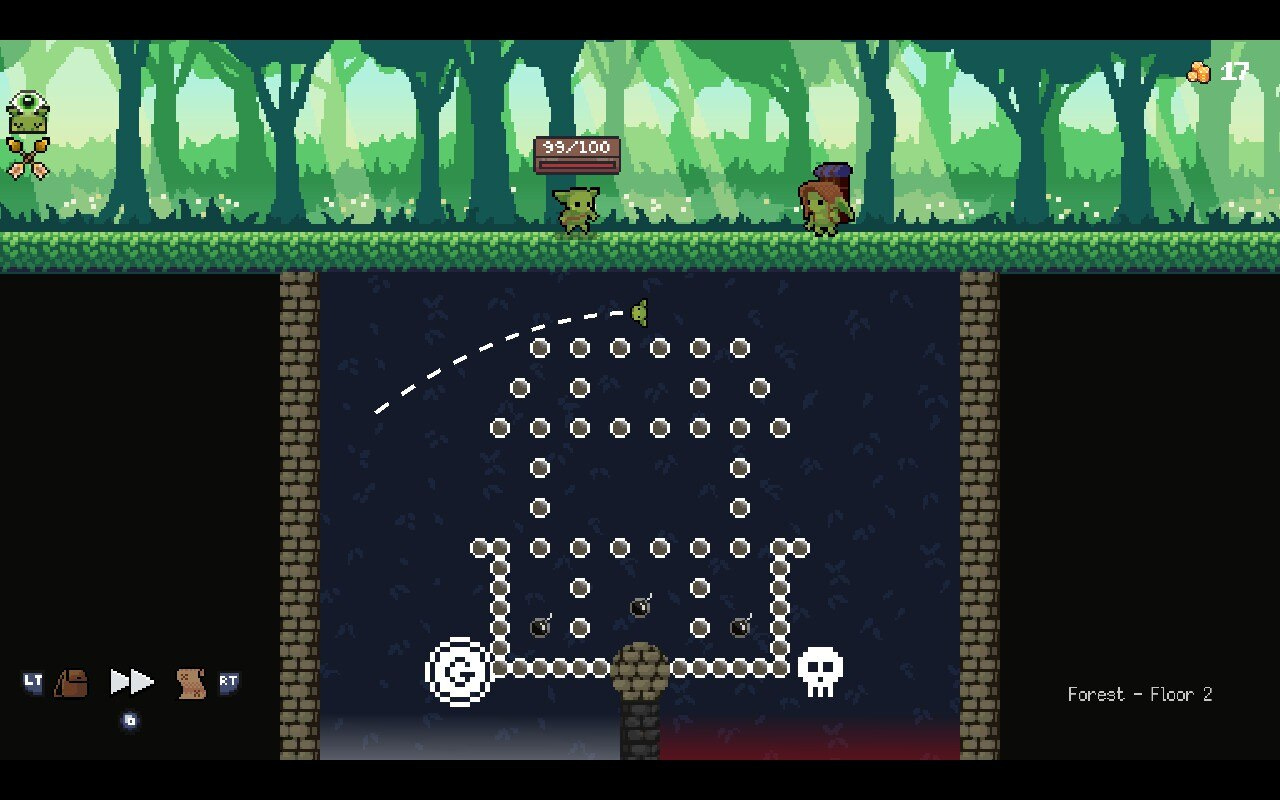Peglin
Your designers were so preoccupied with whether or not they could, that they didn't stop to think if they should
iOS, Android, PC, Mac, Steam Deck
$8.99 to 14.99
Endless(ish)
Peglin is a turn-based “pachinko roguelike” where you fire a ball into a field of pegs that, when hit, deal damage to approaching enemies. After your turn, the enemies move forward and attack, meaning you need to kill them before too many get close and you run out of health.
Some pegs are special, activating “critical” status, which can multiply the power of your attack; detonating a bomb that harms all enemies in view; refreshing all the pegs you’ve removed from the field; or just giving you money. And there are many types of balls (“orbs”) with different properties that you can add to your collection.
At first glance, it’s a simple game – you aim your orb and fire it. It’s impossible to predict where it’ll go beyond the first few bounces, so at the start of the game when you only have a few mediocre orbs and no “relic” power-ups, it’s just about aiming at the nearest critical peg or bomb.
But as you advance, Peglin demands a surprising amount of thought. Enemies get much tougher and defeating them requires opportunistically collecting orbs and relics that best enhance each others’ powers. You can play Peglin fairly mindlessly and die after 30-40 minutes; or you can carefully weigh up every single choice and proceed for hours, level after level, area after area, accumulating items that interact so perfectly they destroy all enemies after a couple of bounces.
Or so I imagine, if I had the patience to learn what choices to make. As a beginner, you have no idea what counts as a “good” orb or relic. You don’t know there’s a relic that gets more powerful the more you have of a certain orb; or that some orbs multiply the power of others’; or the opportunities you’ll be offered in between battles (e.g. upgrading all your orbs, discarding crappy ones, increasing your max health, etc.)
Good roguelikes are designed so that beginners die quickly and learn quickly. Options are kept constrained; powers explained clearly; and the consequences of your choices arrive as fast as possible. Peglin breaks that mould because you spend so much of your time watching rather than doing, slowing down the learning process; and because it has such a dizzying array of choices, there’s so much more to learn.
True, it’s pleasantly soporific to watch your orb bounce around randomly in the hope it’ll hit something cool. That’s why pachinko is so popular; that’s why I spent so much time playing Peggle. I’m just not sure that makes for a great game, no matter how many systems of power-ups you lay on top of it. I certainly don’t think it’s a great use of my time – I spent six hours playing and I barely understand a fraction of the relics and orbs, so I can’t imagine how many dozens of hours it’d take to “get good”. The one time I reached the end of the main campaign was by stumbling on a combination of relics that were so unbeatable (multiball, attacking multiple enemies at once, poisoning enemies, etc.) there was no challenge at all.

At first, I assumed the creators added so much stuff into Peglin because it’s been in Early Access on Steam for over a year. This is when a game is unfinished but still available for sale; perhaps the core mechanics are set but it’s unpolished, or it’s polished but it’s lacking content. Either way, creators are usually very open to community input so they can identify bugs and balance the game’s systems. But to my eye, Peglin is both polished and has an absurd amount of content, so I wonder if the designers have overindulged their community by adding so many orbs and relics and areas and enemies that they’ve made things too complicated for beginners.
But perhaps the problem is that it’s incredibly difficult to balance the inherent randomness of a pachinko-like game with the depth and strategy demanded by roguelike enthusiasts, and more broadly, by gamers as a whole. Every time I play Peglin, I run into a new mechanic that utterly transforms the game, like a relic that adds damage multipliers based on where your orb falls down at the end of a field; or increases the gravitational pull of critical and refresh pegs; or changes the number of times a peg can be hit.
I’m not averse to variety, or learning new strategies (now I know to keep enemies alive as long as possible during early levels so I can collect all the money I can), but what I found delightful at first is now merely exasperating.
(If you think it’s unfair for me to write about a game before it’s “launched”, Peglin is on sale in the App Store and Google Play Store, neither of which recognise “early access”.)




Is there a fine line between idle games (auto games?) and something like Peglin in the sense of the randomness and lack of agency?